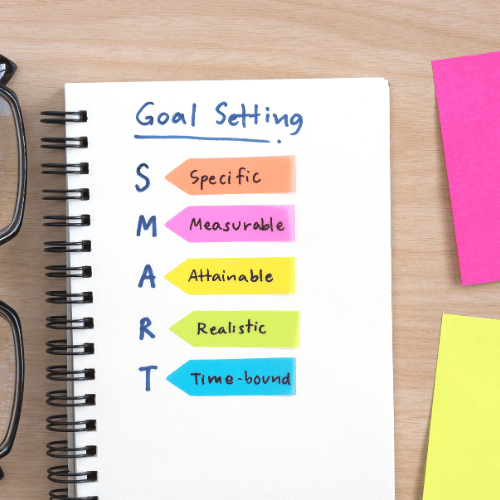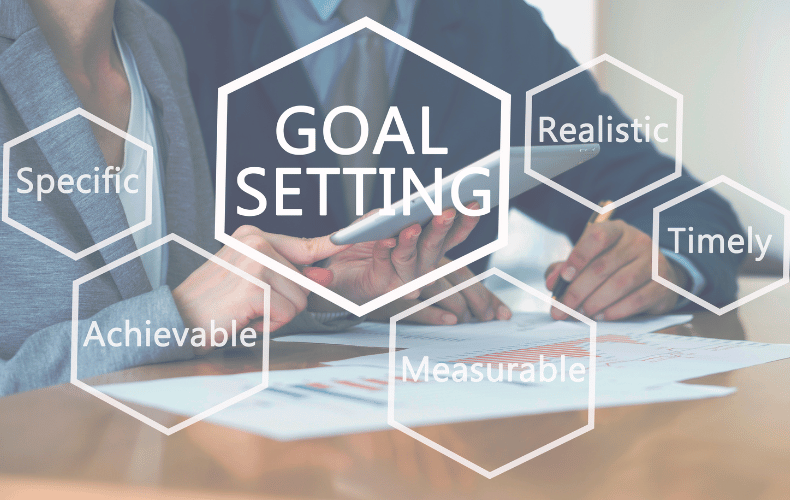- admin
- June 12, 2024
- No Comments
Goal Setting
When you make plans, do you find it hard to follow through? Setting goals well is an important skill that can have a big effect on your personal and professional success. You can stay motivated and on track by reading this guide, which will also teach you strategies and techniques for setting and reaching your personal goals.
Understanding Goal Setting
Setting goals means being clear about what you want to achieve and making a plan for how to get there. Setting clear, doable goals is the key to turning your visions into real results.
The Importance of Goal Setting
Why is it important to set goals? Setting goals the right way helps you:
- Provide direction and focus
- Increase motivation and persistence
- Measure progress and success
- Enhance decision-making skills
- Achieve personal and professional growth


Key Components of Effective Goal Setting
1. Setting SMART Goals
SMART goals are:
- Specific: Make it very clear what you want to do.
- Measurable: Make sure you can keep track of your progress.
- Achievable: Make goals that are reasonable and doable.
- Relevant: Make sure your goals are in line with your bigger goals.
- Time-bound: Give yourself a certain amount of time to reach your goals.
2. Breaking Down Goals
It can be hard to reach big goals. Split them up into smaller tasks that you can handle. This helps you stay on track and keep going.
3. Writing Down Your Goals
Putting your goals on paper helps you remember them and makes them more real. It also makes you more committed and responsible.
Techniques for Achieving Personal Objectives
1. Visualization
Visualization is the process of picturing yourself reaching your goals. This method can make you more motivated and sure of yourself, which can help you feel like you can reach your goals.
2. Action Plans
Make a detailed action plan that shows what you need to do to reach your goals. List due dates, resources needed, and possible problems.
3. Prioritizing
Set your goals in order of how important and urgent they are. Priority goals should be your first focus to make sure you’re having the biggest effect.


Staying Motivated
1. Tracking Progress
Check in on your progress often. Keep track of your progress with journals, spreadsheets, or apps, and change your plans as needed.
2. Celebrating Milestones
No matter how small, be proud of what you’ve done. Seeing how far you’ve come can boost your confidence and keep you going.
3. Accountability Partners
Tell someone you trust about your plans. A partner in accountability can offer support, motivation, and helpful feedback.
Overcoming Obstacles
1. Identifying Challenges
Plan ahead for possible problems and how to solve them. Being ready can keep you on track and stop setbacks from happening.
2. Adapting to Change
You need to be flexible. Be ready to change your plans and goals when you need to. Life is unpredictable, and being able to adapt will help you stay on track when things change.
3. Staying Positive
Keep a positive attitude. Problems are a normal part of the journey. Keeping a positive attitude will help you get through them and keep your eye on your goals.


Goal Setting for Different Life Stages
1. Students
Setting goals is an important part of both academic and personal growth for students. Think about:
- Academic Goals: Make plans for grades, projects, and tests.
- Extracurricular Activities: Set goals for your participation in arts, sports, or clubs.
- Career Planning: Make plans for your internships and future jobs.
2. Professionals
Setting goals in a smart way can help professionals advance in their careers and be happier at work. Think about:
- Career Advancement: Setting goals for promotions, skill development, and networking can help you move up in your career.
- Work-Life Balance: Set goals for keeping a healthy balance between work and life.
- Financial Goals: save, invest, and save for retirement.
3. Retirees
Setting goals is still important for personal happiness after retirement. Think about:
- Health and Wellness: Setting goals for your physical and mental health is good for your health.
- Hobbies and Interests: Set goals for pursuing new interests and hobbies.
- Legacy Planning: Write down your goals for planning your estate and leaving a legacy.
Common Goal Setting Mistakes to Avoid
- Setting Vague Goals: Be sure your goals are clear and specific.
- Lack of Measurement: Add metrics to keep track of your progress.
- Being Unrealistic: To avoid frustration and burnout, set goals that you can reach.
- Ignoring Timeframes: Due dates make things more important and help you stay on track.
Conclusion
Setting good goals is a powerful skill that can help you make your dreams come true. You can reach your personal goals and keep growing if you understand and use strategies like setting SMART goals, picturing yourself succeeding, and staying motivated. Remember that getting to your goals may not be easy, but if you know how to do it, you can get through it and succeed.







